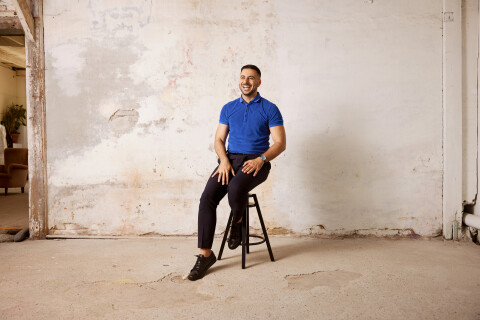
October 21st 2022
About (in)equality
Pouria is gay and therefore fled his native Iran. He can be gay in the Netherlands without any problems. “But the Netherlands has other challenges. People don't consider me equal because I wasn't trained here.” Our partner ABN Amro strives for a culture in which everyone can be themselves and interviewed Pouria about this.
Please note: this article was translated using a translator appWhat do you understand by equal opportunities?
“Then I immediately think of life chances: opportunities for education, for a house, for a work career... Regardless of gender, orientation, skin color, background... That we no longer look at anything specifically and only see people. Life opportunities give you the chance to feel satisfied with your life and experience growth. Equality ensures growth in a society. Inequality has a negative effect on that growth.”
Have you ever experienced inequality?
“In Iran, my country of birth, inequality starts at birth: there is a great inequality between men and women. I experienced a lot of inequality at school. I behaved differently from the rest, was sensitive and vulnerable. Teachers approached me differently as a result. They noticed that I was gay and did not understand me, but they wanted to raise me according to the prevailing norms. I used to feel ashamed the vast majority of the time because people made me feel different. Not everyone liked me.
I came to the Netherlands because you are much more open minded when it comes to sexual orientation. But I experience inequality here in a different way. I am highly educated and really wanted to work at a bank, but that was not easy.
Thanks to the Reboot Program I did get the chance; ABN AMRO heard my voice. And yet here too it took a few years before I was completely in the right place. I felt a lack of confidence in my abilities. It sometimes happens that I am not assigned a case because people assume that it is too complicated for me due to the language barrier. Maybe people think I work 'differently'. In any case, it feels like I have to listen to my colleagues more than they listen to me. That is painful and it makes me feel as if I am not considered fully fledged. But I look from a different, complementary perspective. Fortunately, I can say that now, after all those years revolving around immigration, I really feel settled and successful.”
How do you deal with inequality?
“I never take the easy way out. I fight it and speak out. Especially when it comes to my orientation. I am convinced that I deserve to live my life the way I want to. I call that 'the gift of being a fighter'. I came to the Netherlands as a refugee and started over here. I was able to take that step because I speak English and because I studied in India for four years. I know what it's like to have your life turned around. Not everyone in Iran can do that. I understand if people are afraid to take that step. Because I dared to do it, I now help other refugees as a volunteer. I know what they are up against.”
Why are equal opportunities important?
“When there are equal opportunities for everyone, a society can grow. In the Middle East, the men talk and the women listen. Until recently, women in Saudi Arabia were not even allowed to drive. But we need each other. We need other perspectives to shed light on our own blind spots and renew existing systems. Everyone has something to add.”
How do we achieve equal opportunities?
“By teaching our children, future generations, at school that diversity is something good, normal and very important. The Netherlands is so successful because it conveys that you can be who you are. And that the dialogue is there. It is normal to discuss very personal matters such as sexual orientation in schools. In the Middle East they certainly don't want to discuss these kinds of topics. But here, these types of topics can also be discussed at work. ABN AMRO has a Diversity & Inclusion department. And you're interviewing me now! In this way we learn to understand each other better: first see that there are differences, then discover what those differences mean by talking about them with each other and finally 'practice'. Because everyone has blind spots.”
* Source: ABN AMRO